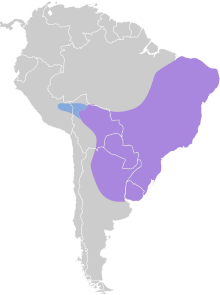| Sayaca tanager | |
|---|---|

| |
| Scientific classification | |
| Domain: | Eukaryota |
| Kingdom: | Animalia |
| Phylum: | Chordata |
| Class: | Aves |
| Order: | Passeriformes |
| Family: | Thraupidae |
| Genus: | Thraupis |
| Species: | T. sayaca
|
| Binomial name | |
| Thraupis sayaca (Linnaeus, 1766)
| |

| |
| Synonyms | |
|
Tanagra sayaca Linnaeus, 1766 | |
The sayaca tanager (Thraupis sayaca) is a species of bird in the family Thraupidae, the tanagers. It is a common resident in northeastern, central, and southeastern Brazil (Portuguese: sanhaço [sɐ̃ˈɲasu] or sanhaçu [sɐ̃ɲaˈsu]), and Bolivia, Paraguay, Uruguay, and northeastern Argentina (where they are known as celestinos or celestinas). A few are recorded from far southeastern Peru, but its status there is unclear, in part due to the potential of confusion with the very similar juveniles of the blue-grey tanager.
It occurs in a wide range of open to semiopen habitats, but generally avoids the interior of dense forest (such as the Amazon). This tanager visits farmland in search of orchards and adapts readily to urban environment, as long as some arboreal cover and a supply of fruits are available. It feeds on flowers, buds, and insects,[2] and this omnivorous lifestyle has helped it to become perhaps the most — or one of the most — common urban birds in southeastern Brazil, along with the rufous-bellied thrush.
- ^ BirdLife International (2012). "Thraupis sayaca". IUCN Red List of Threatened Species. 2012. Retrieved 26 November 2013.
- ^ José Felipe Monteiro Pereira, Aves e Pássaros Comuns do Rio de Janeiro, Rio de Janeiro, Technical Books Editora, 2008, ISBN 978-85-61368-00-5, pg.124
